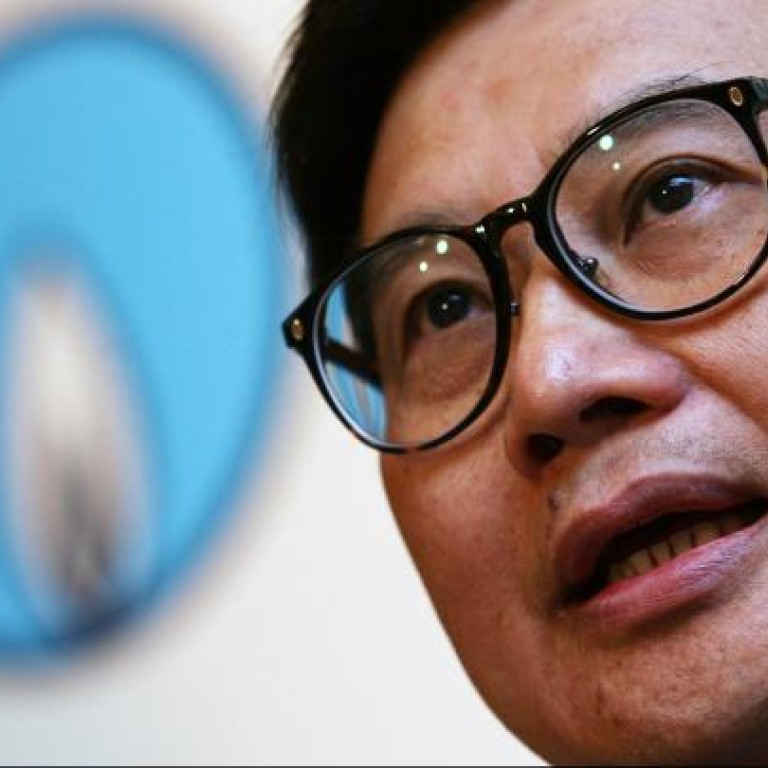
Towngas celebrates its 150th anniversary
From servicing street lights in Central in 1862, Towngas has grown with Hong Kong and is now looking to the mainland for fresh ventures
Hong Kong and China Gas (Towngas), Hong Kong's oldest public utility and only piped-gas distributor, is celebrating its 150th anniversary this year.

"People do not always have to use gas to cook and heat water for bathing, as there are rice-cookers, microwave ovens, induction cookers and electric water heaters," he said.
"We can't be complacent just because we have a good market share. The competitive landscape can change at any time."
Chan, 61, a mechanical engineer by training and profession, first joined Towngas in 1992 as general manager of marketing. He has been managing director since 1997.
"My mandate at the time [in 1992] was to find ways to sell more gas, given the competition from electricity," he said.
One project he initiated was the introduction of gas-powered clothes dryers into the city.
"It was a tough sell since they cost more than hanging out your clothes," he said. "You also got odd questions from homemakers like whether the clothes would be stained by a coal-gas odour and whether there was a risk of the clothes getting burnt."
Besides telling customers dryers were a much quicker and cleaner way to dry clothes that were soft to wear, he said that in the beginning Towngas placed a 20-foot container near a housing estate to demonstrate how gas dryers were installed.
"We actually had to get into the kitchen cabinet installation business because in those days kitchens were not designed to have space for clothes dryers, which drew the ire of a tattooed decoration contractor," he recalled. "Later we moved into our own showroom."
Besides expansion of sales opportunities, Chan said improving user-friendliness and reliability of gas cooking and heating appliances was the key to staying competitive. This included the introduction of free regular equipment checks.
Starting in 1862 with a customer base of 500 street lights in Central, Towngas has expanded over the decades beyond serving only the richest.
Today, it has 1.72 million customers in Hong Kong, of which residential clients account for 55 per cent of sales volume, and industrial and commercial customers take up the remainder.
Its network of 3,500 kilometres of pipeline can connect to 86 per cent of Hong Kong's households. About 71 per cent of households are customers, and 99 per cent of new residential high-rises are linked up to its network.
Chan said that 40 years ago, when people typically had a shower once every two to three days, there was great potential for growth as people grew wealthier. But he said the gas market was now saturated.
"Even with today's young people preferring to live apart from their parents, unless they have children demand growth is very small," he said. "Each year we are adding around 25,000 new household customers, which is about 1.5 per cent growth."
The fuel source also has changed. In 1967 it moved from gas derived from the refining of coal to fuel oil derived from the distillation of crude oil, and in 1973 to naphtha - also derived from crude oil. Each time was a move to a cleaner product.
In 2006, Towngas introduced natural gas from Australia to replace 60 per cent of the naphtha it was using, via a 25-year procurement contract. The low price of the gas at the time meant its fuel costs today remain similar to those in 2006, despite surges in crude oil prices, to which naphtha prices are closely linked.
With operating costs rising due to higher salaries, especially for pipeline and maintenance crews, Chan said pressure was mounting to raise tariffs. He would not be drawn on timing, but noted the public opposition faced by utilities in raising prices, such as the electricity producers.
Facing low growth prospects in Hong Kong, Towngas began expanding into the mainland in 1994, signing a venture deal in Panyu, Guangzhou.
Its biggest break on the mainland came in 1997 when it took control of financially troubled Hong Kong-listed Panva Gas Holdings by injecting 25 projects into Panva.
Today, Towngas has 104 mainland projects, of which 70 are held by Towngas China - previously Panva. The rest are held by Towngas, which wants to expand by 10 to 15 projects annually in the next few years.
With sales projected to reach 12 billion cubic metres this year, Towngas is the largest gas distributor on the mainland.
The mainland contributed its first profit about seven years ago, and now matches Hong Kong's profitability. With gas demand estimated to rise at 15 per cent to 20 per cent a year to 2015, mainland earnings would surely top Hong Kong soon, Chan said. He expects weaker industrial growth to be offset by addition of new customers.
In the next two years Towngas plans to invest HK$10 billion on the mainland, of which HK$7 billion will go to new energy ventures and HK$3 billion to city gas projects. In Hong Kong, it plans to spend HK$4.5 billion to 2016 for pipeline maintenance, upgrades and expansion.

